
Thalaina clara, or Clara's satin moth, is a moth of the family Geometridae. The species was first described by Francis Walker in 1855. It is endemic to south-eastern Australia.
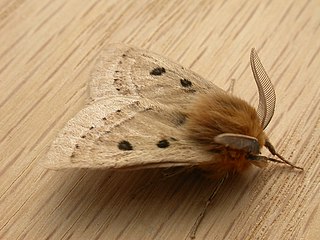
Anthela ocellata, the eyespot anthelid, is a moth of the family Anthelidae. The species was first described by Francis Walker in 1855. It is found in Australia, from Bundaberg to Hobart along the east coast.
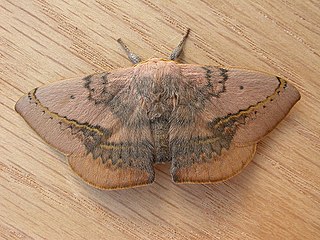
Anthela varia, the variable anthelid, is a moth of the Anthelidae family. The species was first described by Francis Walker in 1855. It is found in the coastal areas of southern Western Australia, southern Queensland, New South Wales, and Victoria.
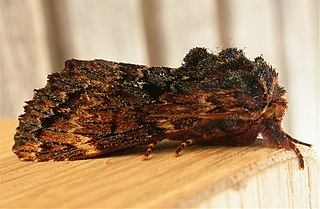
Sorama bicolor, the two-coloured notodontid, is a moth of the family Notodontidae first described by Francis Walker in 1855. It is found in Australia.

Pinara divisa, the common pinara, is a species of moth of the family Lasiocampidae. It was first described by Francis Walker in 1855. It is found in the south-east quarter of Australia.

Pinara cana, the neat pinara, is a species of moth of the family Lasiocampidae first described by Francis Walker in 1855. It is found in the south-east quarter of Australia.

Doratifera quadriguttata, the four-spotted cup moth, is a moth of the family Limacodidae. The species was first described by Francis Walker in 1855. It is found in Australia.
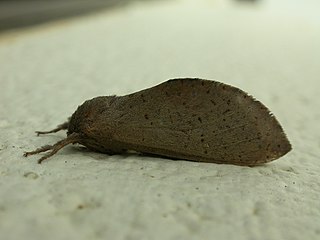
Elhamma australasiae is a moth of the family Hepialidae. It is found along the eastern seaboard of Australia and New Guinea.
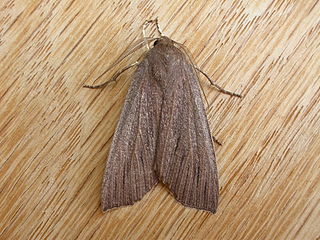
Palleopa is a monotypic moth genus in the family Geometridae. Its only species, Palleopa innotata, the finely-streaked crest-moth, is known from Australia, including Tasmania. Both the genus and species were first described by Francis Walker in 1866.

Porela vetusta, the ancient porela, is a moth of the family Lasiocampidae. It was first described by Francis Walker in 1855. It is found in the Australian states of New South Wales, Queensland, Tasmania and Victoria.
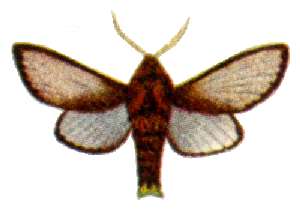
Doratifera oxleyi, the painted cup moth, is a moth of the family Limacodidae. The species was first described by Newman in 1855. An Australian moth, it is found in Sydney and Melbourne, as well as South Australia and Tasmania.

Condica dolorosa is a moth of the family Noctuidae. It is found in the Indo-Australian tropics, including Borneo, Hawaii, Hong Kong, India, Sri Lanka, Taiwan and Queensland in Australia.

Pinara metaphaea, the pinara moth, is a species of moth of the family Lasiocampidae. It was first described by Francis Walker in 1862. It is known from south-east Australia, including New South Wales and Victoria.

Porela subfasciata, the fasciated porela, is a species of moth of the family Lasiocampidae. It was first described by (Francis Walker in 1855 and is known from the Australian states of Tasmania and Victoria.
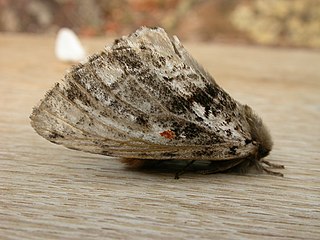
Aglaosoma variegata, the patterned notodontid, is a species of moth of the family Thaumetopoeidae first described by Francis Walker in 1855. It is known from the Australian states of New South Wales, Queensland and Victoria.
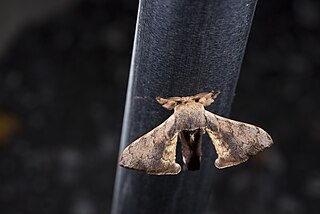
Trilocha varians is a moth in the family Bombycidae described by Francis Walker in 1855. It is widespread in the Oriental region from India, Sri Lanka, China, extending to Taiwan, the Philippines, Sulawesi and Java.

Gesonia obeditalis is a species of moth of the family Noctuidae first described by Francis Walker in 1859. It is found from eastern Africa, the Seychelles, the Maldives and the Oriental tropics of India, Sri Lanka east to the Philippines, the Sula Islands and Australia. The adult moth has brown wings with a scalloped dark brown band near the margin. The hindwings are similar in pattern to the forewings but are a paler shade of brown.
Dreata is a monotypic moth genus in the family Eupterotidae described by Francis Walker in 1855. Its single species, Dreata hades, described by the same author in the same year, is found in Bangladesh, Myanmar and India.

Doratifera is a genus of cup-moth caterpillars in the family Limacodidae. The genus was erected by James Duncan in 1841. There are about 13 described species in Doratifera, found primarily in Australia. The are called cup-moths because of the shape of their cocoons.


















